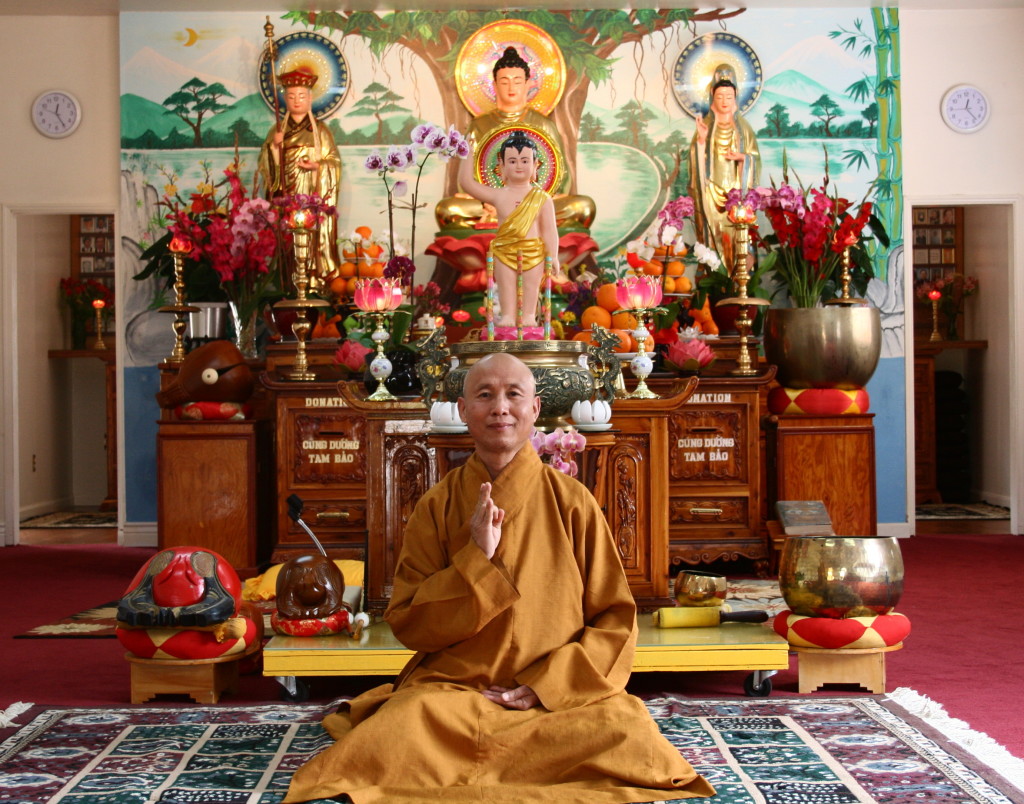When I was a child, about 1 year old, my mother passed away and my father left us. At that time, I lived in Central Vietnam. I lived with one sister, one brother and my cousin, who raised me all the way through elementary and middle school. There was a temple near my house, and when I was 14 years old, I started going to the youth group at this temple. One time, there was a big ceremony at my temple. Many people came, including many nuns and monks. The morning of the ceremony, I saw two monks bowing to each other. Their eyes connected and they bowed to each other gracefully and with much respect, with their hands folded like a lotus. When I saw this, I thought, oh wow, this is wonderful, beautiful. I was really touched. At this moment I knew I wanted to be a monk in the future. When I told my brother about this, he didn’t like it. Both my sister and my brother felt very sad about my decision to become a monk. But I had a cousin who was a monk in Saigon, and when he came to visit, he asked me if I wanted to become a monk, and I said yes. My brother told me that if I go, I must never come back. I thought my brother will change his mind eventually, so I went with my cousin to Saigon. I expected to miss my family and friends, but after about one week I forgot my village because I felt so happy at the temple. As a novice, my job was to invite the bell in the morning and in the evening. When I was inviting the bell many people were chanting mantras and sutras, for example the heart sutra. I memorized it just by listening to the people chanting.
The first time I consciously met my father, I was 14 years old. I went to visit my village. When I arrived, I noticed four people working outside of our house. When they took a lunch break, one of the men said to me: When did you come here? Right away I knew that this was my father. I was so happy to meet him. But he wasn’t happy that I was a monk, he wanted me to live with him. After one week of living and talking with him, I really missed my temple. I went back to the temple and wrote my father a letter explaining that I want to wake up like the Buddha, and that I cannot live with him.
In 1995 I lived at Plum Village in France to practice with Thich Nhat Hanh for one year. The first time I heard him talk, I realized that this was a new way of teaching. I really enjoyed it. After I went back to Vietnam, I brought this practice with me, and the lay practitioners liked it. Walking slowly, breathing deeply, and smiling. Buddhism in the West is growing. Unfortunately, a lot of the Asian monks in the West don’t speak English well enough to be able to teach in English. But there are some monks, like the Dalai Lama and Thich Nhat Hanh, who have done great work in making Buddhist teachings more accessible in the West. Thich Nhat Hanh knows how to explain things in very simple words.
I rarely get angry, because I know it is not good for me. I think to myself, why be angry, it’s not good, and just that thought already calms me down. Thich Nhat Hanh once told me: Look at your face when you get angry, it looks ugly… just smile. When you get angry and you smile, the anger will subside. Sometimes people ask me why I look so young. I tell them it is because I am usually not angry or sad, and I do not think too much. Keep it simple. It keeps you young.
In the morning before sitting meditation, when I light the incense and offer it to the Buddha I feel happy. When I bow to the Buddha I feel happy. When I practice I feel happy. It is not enough to read and think about the Buddha’s teachings, we also need to practice, that is very important. Thinking and listening is 50% and the other 50% needs to be practice. When you practice you feel better, you will be happy.
When I bow to the Buddha I also bow to nature. Nature nourishes me. I love taking care of my bonsai trees, it makes me happy to see them grow. When I take care of them, I sometimes talk to them in my mind. I think the trees listen to me.


